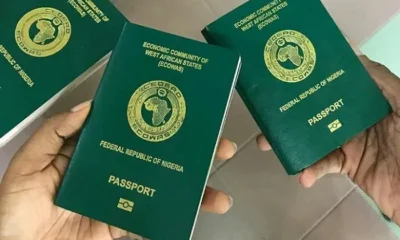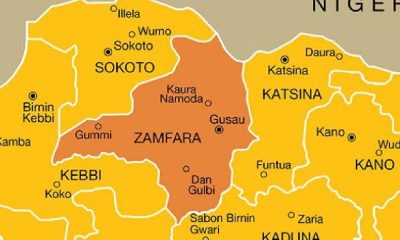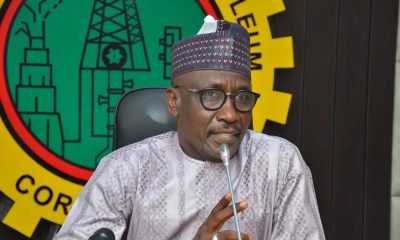News
Breaking! Gunmen attack UNTH

Gunmen, suspected to be kidnappers, have attacked the University of Nigeria Teaching Hospital (UNTH), Ituku Ozalla, in Enugu State, South East Nigeria.
The attack on the University of Nigeria Teaching Hospital by unknown gunmen took place on Tuesday morning, March 12, 2024.
A female deputy director, nursing services, and a security man were said to have been taken away by the hoodlums. An SUV allegedly belonging to the abducted woman, a nurse, was seen abandoned, with bullet-perforated glass on the front passenger side.
Meanwhile, as of the time of filing this report, the Enugu State Police Command and the Teaching Hospital management were yet to confirm the attack.
A competent source to have confirmed that the incident occurred at the same location where a medical doctor was abducted a few weeks ago.
“This is so sad; we are not safe at all in this hospital; everywhere is porous,” a distressed staff member lamented.
News
NTAC Deploys 35 Volunteers to Zanzibar in Support of Nigeria’s 4D Foreign Policy

News
Nigeria’s Strategic Foreign Policy Dilemma: Domestic Politics, Regional Instability, Russia’s Encroaching Geopolitical Influence in West Africa and Sahel

News
Alleged N8bn scam: Achimugu yet to fulfill EFCC bail conditions

Embattled businesswoman Aisha Achimugu is yet to meet the bail conditions set by the Economic and Financial Crimes Commission (EFCC) because her two sureties have no landed property in Abuja.
Aisha was still in custody at the weekend over alleged N8.71billion oil bloc transactions.
The EFCC will on Monday verify the claims of new two sureties.
A top EFCC source said: “Aisha is still in detention until she meets the bail conditions.
“The court mandated the EFCC to set bail conditions. We asked her to bring two sureties with landed property in Abuja. Her sureties could not meet our terms.
She produced new sureties on Friday. We will verify the claims of those standing for her on Monday.
If these sureties do not fulfill the required conditions, she will remain with us.”
She, however, will account for how she came about 136 bank accounts, especially corporate types.
Mrs. Achimugu was declared wanted by the EFCC in March 2025 on allegations of criminal conspiracy and money laundering.
According to an affidavit by an EFCC investigator, Nr. Chris Odofin, Mrs. Achimugu was under investigation for alleged conspiracy, obtaining money by false pretence, money laundering, corruption, and possession of property reasonably suspected to have been acquired through unlawful means
The affidavit also showed the applicant operates a total of 136 bank accounts across 10 different banks, both personal and corporate.
Achimugu, in her statement according to the affidavit, said the inflow of N8.71 billion into her corporate bank accounts was an ”investment fund” for acquisition of an oil bloc.
She said the cash was transferred to the Federal Government’s account through her company, Oceangate Engineering Oil and Gas Limited, referencing documentation from the Nigerian Upstream Petroleum Regulatory Commission (NUPRC).
But findings by the EFCC confirmed that Achimugu’s company actually acquired two oil blocs, Shallow Water PPL 3007 and Deep Offshore PPL 302-DO at the cost of $25.3 million.
The payments were allegedly made through bureau de change operators.
The EFCC was looking at clues on the likely sources of the funds.
The commission also alleged that the acquisition of the oil blocs was not transparent enough.
Nation
-

 Education24 hours ago
Education24 hours agoJAMB Announces Date For Release Of 2025 UTME Results
-

 News11 hours ago
News11 hours agoFive Asian countries Nigerians can visit without a visa
-

 Entertainment11 hours ago
Entertainment11 hours agoOld Prophecy Of Pastor About VeryDarkman Goes Viral After His Arrest
-

 News11 hours ago
News11 hours agoInsecurity! Bandits abduct 25 female wedding guests
-

 News11 hours ago
News11 hours agoEzekwesili slams political establishment over harassment allegation, defends Natasha
-

 News11 hours ago
News11 hours agoTompolo Launches Door-to-Door Campaign for Tinubu’s 2027 Re-Election!
-

 News5 hours ago
News5 hours agoINTERPOL uncovers 150 stolen vehicles from Canada in Nigeria, Gambia, other W.A. countries
-

 News11 hours ago
News11 hours agoKyari breaks silence: “I’m not in EFCC custody, I served God, country, not corruption”






